瞬间动词用法总结
现在完成时中瞬间动词变延续性动词总结
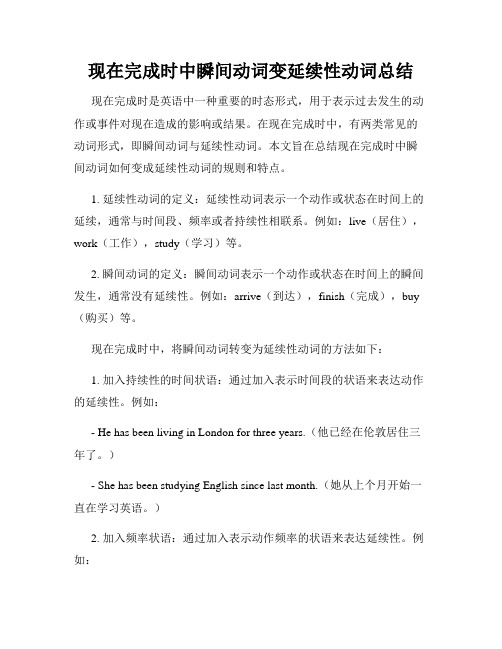
现在完成时中瞬间动词变延续性动词总结现在完成时是英语中一种重要的时态形式,用于表示过去发生的动作或事件对现在造成的影响或结果。
在现在完成时中,有两类常见的动词形式,即瞬间动词与延续性动词。
本文旨在总结现在完成时中瞬间动词如何变成延续性动词的规则和特点。
1. 延续性动词的定义:延续性动词表示一个动作或状态在时间上的延续,通常与时间段、频率或者持续性相联系。
例如:live(居住),work(工作),study(学习)等。
2. 瞬间动词的定义:瞬间动词表示一个动作或状态在时间上的瞬间发生,通常没有延续性。
例如:arrive(到达),finish(完成),buy (购买)等。
现在完成时中,将瞬间动词转变为延续性动词的方法如下:1. 加入持续性的时间状语:通过加入表示时间段的状语来表达动作的延续性。
例如:- He has been living in London for three years.(他已经在伦敦居住三年了。
)- She has been studying English since last month.(她从上个月开始一直在学习英语。
)2. 加入频率状语:通过加入表示动作频率的状语来表达延续性。
例如:- They have been playing tennis every weekend.(他们每个周末都在打网球。
)- I have been working out at the gym twice a week.(我每周在健身房锻炼两次。
)3. 加入表示动作状态的状语:通过加入表示动作状态的状语来表达延续性。
例如:- The team has been practicing hard for the upcoming tournament.(这个团队一直在为即将到来的比赛进行努力训练。
)- She has been studying diligently for her exams.(她为了考试一直努力学习。
英语瞬间动词表完成状态的用法

一、瞬间动词与现在完成时英语中,有些动词只表示短暂的动作,所表示的动作瞬间即可完成,因此这类动词称为瞬间动词或终止性动词。
如:close, open, join, buy, die, begin, start, come, go等。
瞬间动词都可以表示动作“已完成”。
如:I have lost my watch.我把表丢了。
瞬间动词不能和表示一段时间的短语或从句连用。
不能与How long 连用I have bought my watch for ten years.(×)She has turned on the light since she came in. (×)瞬间动词的“已完成”动作如果要与表示一段时间的状语(或状语从句)连用,一般可以通过下面几种方式来表示:1. 用意义相近或相同的延续性动词来代替,这种延续表达法大都是表示状态的。
如:His father has been dead for five years.(not“has died”)他爸爸去世五年了。
为了便于掌握,下面将瞬间动词转换成延续性动词的情况列举如下:arrive, come→be here, be inbegin, start→be onbuy→havedie→be deadfinish, end→be overget up→be upgo out→be outjoin→be in, be a +名词leave, move→be away, be out ofborrow→keep2. 用“It is/ has been +时间+since…”句型。
如:It is/ has been 10 years since I last saw him.(从我上次见到他以来已经10年了。
)It is five minutes since the meeting began. 会议开始五分钟了。
It is two years since we got to know each other. 我们互相认识已有两年了。
英语知识 _ 初中英语,延续性动词和瞬间性动词的用法

一、延续性动词延续性动词,表示的动作不但可以延续,而且可以产生持久的影响。
常见的这类动词有:b e,h a v e,ke e p,k n o w,l e a r n,l i e,l i v e,re a d,s i n g,s l e e p,s t a n d,s t a y,w a i t,w a l k,w a tc h等。
延续性动词的用法很广,但常见于现在完成时中的句子中,且常与f o r,h o w,l o n g,s i n c e 等引导的表示一段时间的状语或状语从句连用。
例如:I h a v e l e a r n e d m o re t h a n1000C h i n e s e w o rd s s i n c e I c a m e t o C h i n a.自从来到中国,我已经学会了l千多个汉字。
I h a v e ke p t t h e p i c t u re f o r a b o u t t h re e y e a r s.。
这张画我保存了大约三年二、瞬间性动词瞬间性动词,又称为终止性动词或非延续性动词,它表示的动作不能延续,也就是说动作一旦发生就立即结束,并产生某种结果。
常见的这类动词有:a c c e p t,a r r i v e,b ec o m e,b e g i n,b o r ro w,b re a k,b u y,c a tc h,c l o s e,c o m e,d i e,e n d,f a l l,f i n i s h,g e t,g i v e,g o,j o i n,l e a v e,p u t,re a c h,re c e i v e,sh u t,s t a r t,s t o p等。
用在现在完成时要注意下面三点:①瞬间性动词可直接用来表示某一动作的完成。
例如:T h e y h a v e re a c h e d S h a n g h a i.他们已经到达了上海。
瞬间动词变延续性动词

英语中瞬间动词和延续性动词一、瞬间动词和延续性动词的含义及用法:1.瞬间动词是指动作短暂、不长久的动词,如begin, become, sell, buy, borrow等。
其用法有:①常与点时间连用。
例如:She often goes to bed at ten.她经常十点钟睡觉。
②不能与段时间连用。
例如:He has joined the army for two years. (×)She has come here for half an hour. (×)2.延续性动词是指长久的、可以延续的动词,如sleep, know, keep, wait, study等。
其用法为:①常与段时间连用。
例如:Mr Zhang has lived here for two years.张先生在这儿住了两年了。
He has taught there since 1987.自1987年来他一直在那儿教书。
②不与点时间连用(do, have, eat等除外)。
例如:Mary has worked at eight. (×)She walked at five yesterday.(×)二、非延续性动词可以转换成延续性动词,主要有以下几种:三、①、用相应的延续性动词;四、buy ------ have, borrow ----- keep, put on ------ wear,五、 catch/get a cold ------ have a cold, come/go/become ------ be.六、②、转换成 be+名词;七、join the Party ------ be a Party member,八、join the army ------ be a soldier,九、go to school ------ be a student.十、③、转换成be + 介词短语 :十一、go to school ------ be in school,十二、join the army ------ be in the army.十三、④、转换成be + adj./adv. :十四、die ------ be dead, finish ------ be over,十五、begin/start ------ be on, leave (…) ------ be away (from), 十六、close ------ be closed, open ------ be open, fall asleep ------ be asleep.十七、常见的瞬间动词变为延续性动词:1、go——be away2、come/arrive——be here3、come back——be back4、leave——be away(be not here)5、buy——have6、borrow——keep7、die——be dead8、begin——be on 9、finish/end——be over 10、open——be open11、close——be closed 12、lose——be lost 13、get to know——know 14、 turn on——be on 15、get up——be up 16、sit down——sit/be seated 17、join——be in(…)或be a…member 18、become——be a19、marry—— be marrie 20、fall asleep——be asleep 21、put on——be in /wear22、catch a cold——have a cold 23、go out——be ou例句:1、他买了这本书两年了。
瞬间动词的用法

瞬间动词的用法1.begin / start -------The meeting began 30minutes ago.The meeting for 30 minutes.2.die -------He died 2 weeks ago.He for 2 weeks.3.leave -----They left Wuhan 3 days ago.They Wuhan for 3 days.4.become------Jim became a doctor one year ago.Jim a doctor for one year.5.finish ----The meeting finished an hour ago .The meeting for an hour.6.borrow------He borrowed a pen from me two days ago.He a pen for two days .7.buy-----She bought some fruit 3 hours ago.She some fruit for 3 hours .e here-----They came here 10 minutes ago.They here for 10 minutes .9.go there-----The boys went there 2 hours ago.The boys there for 2 hours .e to China-----①The Greens came to China 5 months ago .The Greens China for 5 months .②He went to the USA 10 years ago .He the USA for 10 years.11.join -----①He joined the army two years ago .He the army for 2 years .He a soldier for 2 years .②I joined the English club 3 months ago .I the English club for 3 months .I of the English club for 3 months.12.marry-----They married ten years ago.They for ten years.12.catch a cold-----He caught a cold last week.He a cold for a week.13.get / arrive here/ there----14.get to / arrive in China----。
瞬间动词用法总结

瞬间动词用法总结瞬间动词是指动作在很短时间内完成,无延续性。
它也称非延续性动词或短暂性动词。
如:come, go, leave, arrive, join, borrow, lend, die, begin, start等.1.I have had the bike for three years.(买)瞬间动词的完成时肯定式不能与表示一段时间的for 时间状语连用。
2.How long have you been away from Guangzhou?(离开)瞬间动词不与How long引导的疑问句连用。
3. Could you look after my baby while I am away?(离开)瞬间动词不与while引导的时间状语连用。
4.I have learned English since 1995。
(开始学习)瞬间动词不与since引导的时间状语连用。
5. I’ll be there and stay until next week. (去呆在那里)瞬间动词不与until引导的时间状语连用。
6.Tom has ever been to China twice.(到过)7.How long can I keep this book?(借)8.He has been in the league for two years.(加入)9. He has been a league member for 3 years。
(加入)10.She has been away from home for 3 years.(离开)11.When we got to the cinema, the film had been on for 10 minutes.(开始)12.He has been dead for 5 years.(死亡)13. She has been here for 2 month.(来)14.She has been a party member for 5 years.(加入)15.He hasn’t come back for over a year.瞬间动词的完成时否定式能与表示一段时间的for 时间状语连用。
瞬间动词用法

瞬间动词瞬间动词,也叫终止性动词、结束性动词、非延续性动词。
这类动词所表示的动作在瞬间就可以完成,不能延续下去,即动作从开始到结束所持续的时间极短。
瞬间动词往往表示动作的结果,或表示短暂性、一次性的动作。
一般不能同表示一段时间的状语连用。
(一)这类动词常见的有:arrive,become,begin,buy,catch(感染,染上,如:catch a cold),close,come,fall,fall ill,find,get to(know),go,hear,hear from,join,kill,land(着陆),leave(离开),lose,see,等。
例如:1. He has joined the club for a long time. (错)2. He has been a member of the club for a long time . (对)3. His grandfather has died for over 30 years. (错)4. His grandfather has been dead for over 30 years . (对)【注意】之所以将这些动词称为瞬间动词,是因为这些动词在眨眼之间发生并终结。
故不能与表达“段”的长时间状语连用,不论是在进行时还是现在完成时中。
下面的例句是正确的:1. He is dying.2. He has died.一个生物体是死是活,界与其终结生命的前与后的一霎那,如果上述例句加上了表达段的时间状语,试请问:该人是死是活?(二)但是,有几个表示去向的非延续性动词如go,come,start,leave 等,可以同表示时间段的状语for 短语连用。
但要注意,这种用法的for 短语表示的不是句中谓语动词延续的时间,而是该动词动作完成后再做某事所需要的时间。
例如:1. She has gone to Nanjing for three days. (= She’s come here,intending to stay for three days.)2. Alice has left for Paris for three months . (= Alice has left for Paris ,intending to stay there for three months.)3. We are starting for Shanghai for two weeks. (= We are going to Shanghai ,and we are planning to stay there for two weeks.)【注意】如果遇到与第一点所不符的情况,如本点所讲述,不要轻易下结论为“错题”,应该认真分析后再做结论。
瞬间动词和延续性动词.

一.瞬间动词和延续性动词的含义及用法瞬间动词(非延续性动词或短暂性动词):是指动作在很短时间内完成, 无延续性。
如come go 等终止性动词和延续性动词:延续性动词: live ,run, stay, clean ,play ,hold ,watch ,teach, read ,study,teach ,eat ,drink ,write ,dance , sing ,smoke瞬间性动词:open, stop ,like ,love ,die ,win ,close ,shot ,begin ,start enter ,finish1. 终止性动词:表示不能延续的动作,即动作发生后立即结束。
如:begin,arrive,borrow,buy ,break,close,come,fall,dic,finish,go,leave,lend,mary,reach,receiv e,open,sell ,start,stop 等。
终止性动词的肯定式是不能持续的,所以不能和表示一段时间的状语连用,终止性的否定式就可以和表一段时间的状语连用,因为否定本身就是可以延续的。
如:have a cold是持续性动词,表示“状态”,可与表延续性的时间状语连用,不定冠词不能省略。
I ′ve had a cold since my arrival.I didn′t go to school because I had had a bad cold for days.catch / take ,get a cold是短暂性动作,表“动态”:它不能和延续性时间状语连用,不定冠词“a ”可有可无,catch 可用代替。
Put on your coat ,or you′ll catch / take / get a cold.Take care not to get cold.但是,若cold 前有形容词修饰时,则不定冠词不能省。
短暂性动词及连续性动词辨析及用法

短暂性动词及连续性动词辨析及用法短暂性动词也称非延续性动词、瞬间动词,表示不能延续的动作发生后立即结束。
open,close,finish,begin,come,go,arrive,reach,getto,leave,move,borrow,b uy,die,see,hear,fall,start,like,love,win,shot,enter,finish,lend,连续性动词live,run,stay,clean,play,hold,watch,teach,read,study,teach,eat,drink,write, dance, sing,smoke具体用法:1、终止性动词:表示不能延续的动作,即动作发生后立即结束。
如:begin,arrive,borrow,buy,break,close,come,fall,dic,finish,go,leave,lend,ma ry,reach,receive,open,sell,start,stop等。
终止性动词的肯定式是不能持续的,所以不能和表示一段时间的状语连用,而终止性的否定式就可以和表一段时间的状语连用,因为否定本身就是可以延续的。
如:have a cold是持续性动词,表示“状态”,可与表延续性的时间状语连用,不定冠词不能省略。
I′ve had a cold since my arrival(到达n.).I didn′t go to school because I had had a bad cold for days.catch a cold是短暂性动作,表“动态”:它不能和延续性时间状语连用,不定冠词“a”可有可无,catch可用take,get代替,1,Put on your coat,or you′ll catch/take/get a cold. 2,T ake care not to get cold. ,但是,若cold前有形容词修饰时,则不定冠词不能省。
瞬间动词的用法
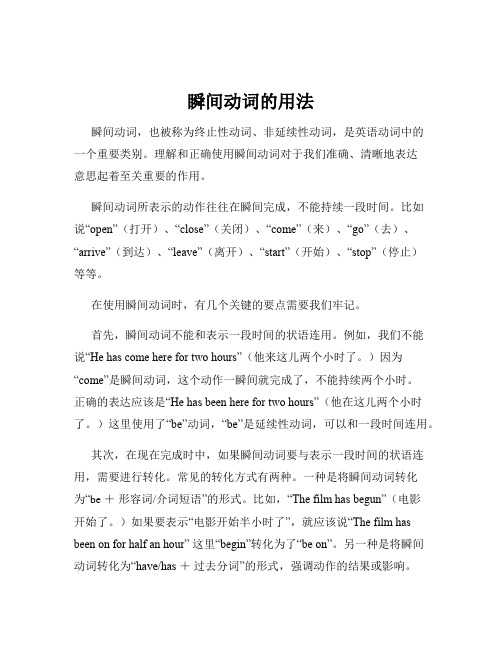
瞬间动词的用法瞬间动词,也被称为终止性动词、非延续性动词,是英语动词中的一个重要类别。
理解和正确使用瞬间动词对于我们准确、清晰地表达意思起着至关重要的作用。
瞬间动词所表示的动作往往在瞬间完成,不能持续一段时间。
比如说“open”(打开)、“close”(关闭)、“come”(来)、“go”(去)、“arrive”(到达)、“leave”(离开)、“start”(开始)、“stop”(停止)等等。
在使用瞬间动词时,有几个关键的要点需要我们牢记。
首先,瞬间动词不能和表示一段时间的状语连用。
例如,我们不能说“He has come here for two hours”(他来这儿两个小时了。
)因为“come”是瞬间动词,这个动作一瞬间就完成了,不能持续两个小时。
正确的表达应该是“He has been here for two hours”(他在这儿两个小时了。
)这里使用了“be”动词,“be”是延续性动词,可以和一段时间连用。
其次,在现在完成时中,如果瞬间动词要与表示一段时间的状语连用,需要进行转化。
常见的转化方式有两种。
一种是将瞬间动词转化为“be +形容词/介词短语”的形式。
比如,“The film has begun”(电影开始了。
)如果要表示“电影开始半小时了”,就应该说“The film has been on for half an hour” 这里“begin”转化为了“be on”。
另一种是将瞬间动词转化为“have/has +过去分词”的形式,强调动作的结果或影响。
例如,“He has left”(他离开了。
)如果要表示“他离开三天了”,可以说“He has been away for three days”再来看瞬间动词在一般过去时中的使用。
在一般过去时中,瞬间动词通常用于表示过去某个时间点发生的动作。
比如,“He came to Beijing yesterday”(他昨天来北京了。
瞬间动词不同用法

瞬间动词不同用法瞬间动词,也叫终止性动词、非延续性动词,是指动作在瞬间完成,不能持续一段时间的动词。
在英语学习中,理解和正确使用瞬间动词对于准确表达意思至关重要。
首先,让我们来明确一些常见的瞬间动词,比如“open”(打开)、“close”(关闭)、“start”(开始)、“stop”(停止)、“come”(来)、“go”(去)、“arrive”(到达)、“leave”(离开)等等。
这些动词所表示的动作往往在一瞬间就完成了。
瞬间动词在句子中的使用有一些特定的规则和需要注意的地方。
当我们想要表达某个动作的发生时,瞬间动词可以直接使用。
例如,“The train arrived at the station just now”(火车刚刚到达车站。
)这里的“arrived”就清晰地表明了到达这个瞬间动作的发生。
然而,当我们要表达一个动作持续的时间或者在一段时间内的状态时,瞬间动词就不能直接与表示一段时间的状语连用。
比如说,我们不能说“He has come here for two days”(×)因为“come”是瞬间动词,不能持续两天。
正确的表达应该是“He has been here for two days”(√)这里使用了“be”动词的现在完成时态来表示持续的状态。
另外,瞬间动词在进行时态中也有其特殊的用法。
一般来说,瞬间动词的进行时态往往表示即将发生的动作。
比如,“The bus is coming”(公交车要来了。
)这里的“is coming”表示即将到来的动作。
瞬间动词还常常与“when”引导的时间状语从句搭配使用。
例如,“When the teacher came in, the students were talking loudly”(当老师进来时,学生们正在大声讲话。
)这里的“came in”是瞬间动作,与“were talking”这个持续的动作形成了对比。
在完成时态中,瞬间动词如果要与表示一段时间的状语连用,就需要进行相应的转换。
谈谈瞬间动词的进行式用法

谈谈瞬间动词的进行式用法在通常情况下,瞬间动词是不用于进行时态的。
但某些特殊场合,瞬间动词也可用于进行时态,其用法主要有以下几种:一、表示反复或重复英语中有少数瞬间动词可以用于现在进行时表示不断重复的动作,这类动词主要有j ump, knock, kick, hit, nod, tap, wink, cough, shoot, drop等。
如:Someone is knocking. 有人敲门。
John is nodding his head. 约翰频频点头。
He is jumping up and down. 他上下地跳着。
Why is she blinking her eyes? 她为什么老眨眼睛?如果主语为复数,某些动词的现在进行时往往有“不断”或“一个接一个”的含义,如:People are dying in that part of the world. 在那个地方人们不断地死去。
Men are dropping with malaria, dysentery and simple starvation. 士兵们由于疟疾、痢疾或仅仅因为饥饿一个接一个地倒了下去。
二、表示即将发生注意有些瞬间动词的现在进行时并不表示动作的重复,而是表示动作即将发生。
如:Julyan is coming right away. 朱利安马上就来。
She is getting married next December. 她12月结婚。
What time are you leaving? 你什么时候动身?They’re having a party next week. 下星期他们将开一个晚会。
You’re young people. You ate only beginning to live. 你们是年轻人,刚刚开始生活。
三、表示即将结束有些瞬间动词的现在进行时则表示动作即将结束,如:I am finishing. 我快做完了。
瞬间动词用法
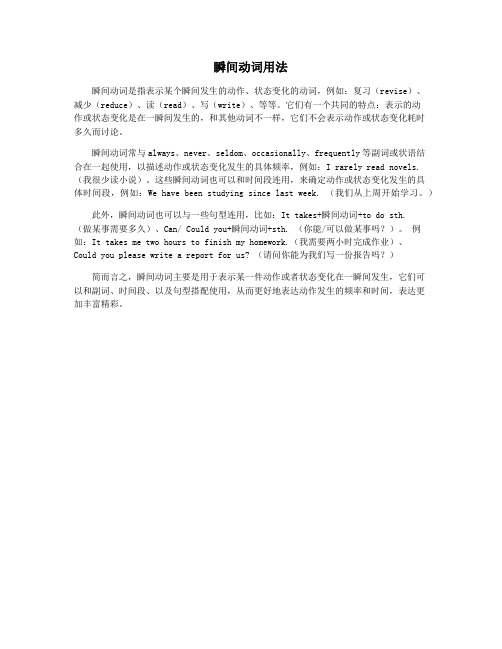
瞬间动词用法
瞬间动词是指表示某个瞬间发生的动作、状态变化的动词,例如:复习(revise)、
减少(reduce)、读(read)、写(write)、等等。
它们有一个共同的特点:表示的动
作或状态变化是在一瞬间发生的,和其他动词不一样,它们不会表示动作或状态变化耗时
多久而讨论。
瞬间动词常与always、never、seldom、occasionally、frequently等副词或状语结
合在一起使用,以描述动作或状态变化发生的具体频率,例如:I rarely read novels.(我很少读小说)。
这些瞬间动词也可以和时间段连用,来确定动作或状态变化发生的具
体时间段,例如:We have been studying since last week. (我们从上周开始学习。
)
此外,瞬间动词也可以与一些句型连用,比如:It takes+瞬间动词+to do sth.
(做某事需要多久)、Can/ Could you+瞬间动词+sth. (你能/可以做某事吗?)。
例如:It takes me two hours to finish my homework.(我需要两小时完成作业)、
Could you please write a report for us? (请问你能为我们写一份报告吗?)
简而言之,瞬间动词主要是用于表示某一件动作或者状态变化在一瞬间发生,它们可
以和副词、时间段、以及句型搭配使用,从而更好地表达动作发生的频率和时间,表达更
加丰富精彩。
瞬间动词的用法是什么(文档6篇)
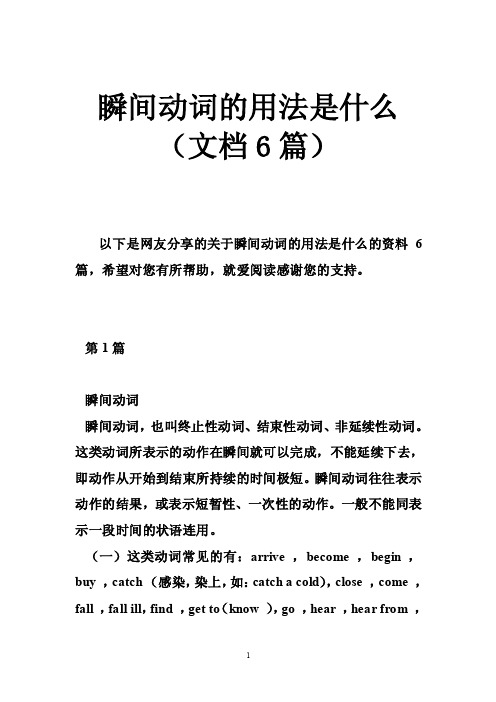
瞬间动词的用法是什么(文档6篇)以下是网友分享的关于瞬间动词的用法是什么的资料6篇,希望对您有所帮助,就爱阅读感谢您的支持。
第1篇瞬间动词瞬间动词,也叫终止性动词、结束性动词、非延续性动词。
这类动词所表示的动作在瞬间就可以完成,不能延续下去,即动作从开始到结束所持续的时间极短。
瞬间动词往往表示动作的结果,或表示短暂性、一次性的动作。
一般不能同表示一段时间的状语连用。
(一)这类动词常见的有:arrive ,become ,begin ,buy ,catch (感染,染上,如:catch a cold),close ,come ,fall ,fall ill,find ,get to(know ),go ,hear ,hear from ,join ,kill ,land (着陆),leave (离开),lose ,see ,等。
例如:1. He has joined the club for a long time. (错)2. He has been a member of the club for a long time . (对)3. His grandfather has died for over 30 years. (错)4. His grandfather has been dead for over 30 years . (对)【注意】之所以将这些动词称为瞬间动词,是因为这些动词在眨眼之间发生并终结。
故不能与表达“段”的长时间状语连用,不论是在进行时还是现在完成时中。
下面的例句是正确的:1. He is dying.2. He has died.一个生物体是死是活,界与其终结生命的前与后的一霎那,如果上述例句加上了表达段的时间状语,试请问:该人是死是活?(二)但是,有几个表示去向的非延续性动词如go ,come ,start ,leave 等,可以同表示时间段的状语for 短语连用。
瞬间动词在现在完成时态中的用法

• open(v.) – be open (adj.开门的、开始营业的) • Sweetie’s Sweets Shop opened at 8:00 today. It’s 10:00 now. • Sweetie’s Sweets Shop has been open for 2 hours.
• come back – be back • Harry came back from Mars a month ago. • Harry has been back from Mars for a month.
• buy – have • Tony bought a comic book a week ago. • Tony has had this comic book for a week.
• • • •
瞬间动词的肯定式不能与表示一段时间 的状语连用: I have left Xi’an for 3 days. × I left Xi’an 3 days ago. √ He has died for 5 month.× He died 5 month ago. √
但瞬间动词的否定式可以与表示一段时间 的状语连用: • I haven’t left home for a month. • I haven’t seen 能与表示一段时间的 状语连用,但可以转换为对应的延续性动词后 再接段时间状语。 • leave – be away from • I left Xi’an 3 days ago. • I’ve been away from Xi’an for 3 days.
• come – be • Elena came here 5 minutes ago. • Elena has been here for 5 hours.
second的用法总结大全
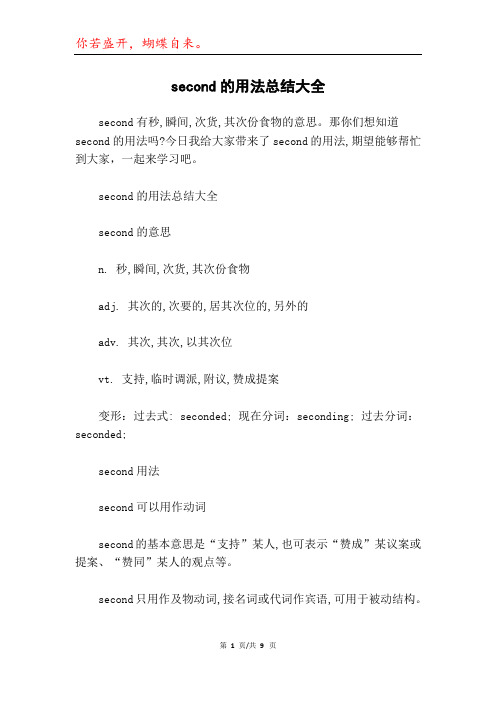
second的用法总结大全second有秒,瞬间,次货,其次份食物的意思。
那你们想知道second的用法吗?今日我给大家带来了second的用法,期望能够帮忙到大家,一起来学习吧。
second的用法总结大全second的意思n. 秒,瞬间,次货,其次份食物adj. 其次的,次要的,居其次位的,另外的adv. 其次,其次,以其次位vt. 支持,临时调派,附议,赞成提案变形:过去式: seconded; 现在分词:seconding; 过去分词:seconded;second用法second可以用作动词second的基本意思是“支持”某人,也可表示“赞成”某议案或提案、“赞同”某人的观点等。
second只用作及物动词,接名词或代词作宾语,可用于被动结构。
second用作动词的用法例句Second, smoking is harmful also to your family members.其次,吸烟也会给你的家人带来危害。
Second, he failed to make clear his true purpose.其次,他没有把他的真实目的表达清晰。
The motion has been seconded.这一提议得到了支持。
second用作动词的用法例句The motion has been seconded.这一提议得到了支持。
I second his motion that we should set up a special board to examine the problem.他提议成立一个特殊委员会来讨论这个问题,我赞成。
Mrs Smith proposed the vote of thanks, and Mr Jones seconded.史密斯夫人提议大家鼓掌表示感谢,琼斯先生附议。
second用法例句1、This brings us to the second question I asked.这就将我们带到了我所提的其次个问题。
(完整word版)瞬间动词用法总结

中考瞬间动词用法总结瞬间动词又称非延续性动词,可以有现在完成时态,但不可以接一段时间.若要接一段时间,需要做一些相应的变换.瞬间动词在完成时态中的否定式可以接一段时间.如:I haven’t bought anything for two months。
常用瞬间动词有:1, come,go, get to, reach,arrive,leave,see,hear2. buy, sell, open, close,get up3。
join,take part in,begin,start, return, give, borrow, lend4,become, turn, bring,take, die, finish,end, receive,hear from, marry,The spaceship is returning to the earth.I'm leaving for Hangzhou.Wrong: How long have you left school?How long is it since you left school?How long ago did you leave school?How long have you been away from school?Wrong: He has bought the computer for two months.He has had the computer for two months。
He bought the computer two months ago。
It is (has been)two months since he bought the computer.Two months have passed since he bought the computer.I didn’t know it until yesterday。
瞬时性动词

4、转换成be + adj./adv.; die————be dead finish————be over begin/start————be on leave(…)————be away (from) close————be closed open————be open fall asleep————be asleep e.g. I have been married for 7 years.
当瞬时性动词用于完成时态时,其后不能跟表示一段时 间的时间状语,如果必须跟时间状语,可以采用下列方 法:
1、用相应的延续性动词;
buy————have
borrow————keep
put on————wear
catch/get a cold————have a cold
come/go/become————ed Beijing five days ago.
Mr. Wang has been in Beijing for five days.
6.My son fell asleep half an hour ago. My son has been asleep for half an hour.
3.The factory opened in1996.
The factory has been open for ten years.
4.His grandfather died five years ago. His grandfather has been dead for five years.
Practice:
1.Li Lei joined the Party three years ago.
Li Lei has been in the Party for three years.
动词的瞬时性与连续性[精华]
![动词的瞬时性与连续性[精华]](https://img.taocdn.com/s3/m/a6ff8418b42acfc789eb172ded630b1c59ee9b01.png)
一、怎么判别单词是持续性动词还是瞬间动词英语中,动词按其动作发生的方式、动作发生过程的长短,可分为延续性动词和终止性动词。
终止性动词也称非延续性动词、瞬间动词或短暂性动词,表示不能延续的动作,这种动作发生后立即结束。
如open, close, finish, begin, come, go, arrive, reach, get to, leave, move, borrow, buy, catch a cold, hear, hear from等。
延续性动词表示能够延续的动作,这种动作可以延续下去或产生持久影响。
如:learn, work, stand, lie, know, walk, keep, have, wait, watch, sing, read, sleep, live, stay等。
二、持续性动词和瞬时性动词用法解析1、因为瞬时性表示动作是短暂的不能够持续,瞬时性动词的现在完成时不能与表示一段时间的状语连用如:since,for等引导的状语。
He has died for three years.(错误)因为die是一个瞬时性动词,所以不能和for three years 表示一段时间的时间状语连用但是可以改成:He has been dead for three years. 将句中终止性动词转换为相应的延续性动词He died three years ago. 将句中表示"段时间"的状语改为表示过去确定时间的状语It is three years since he died. 用句型"It is+段时间+since..."表达Three years has passed since he died. 用句型"时间+has passed + since..."表达练习:He has come here for five days. 将其改为正确的。
- 1、下载文档前请自行甄别文档内容的完整性,平台不提供额外的编辑、内容补充、找答案等附加服务。
- 2、"仅部分预览"的文档,不可在线预览部分如存在完整性等问题,可反馈申请退款(可完整预览的文档不适用该条件!)。
- 3、如文档侵犯您的权益,请联系客服反馈,我们会尽快为您处理(人工客服工作时间:9:00-18:30)。
中考瞬间动词用法总结
瞬间动词又称非延续性动词,可以有现在完成时态,但不可以接一段时间.若要接一段时间,需要做一些相应的变换。
瞬间动词在完成时态中的否定式可以接一段时间.
如:I haven’t bought anything for two months.
常用瞬间动词有:
1, come, go, get to, reach, arrive, leave, see, hear
2. buy, sell, open, close, get up
3. join, take part in, begin, start, return, give, borrow, lend
4, become, turn, bring, take, die, finish, end, receive, hear from, marry,
The spaceship is returning to the earth.
I’m leaving for Hangzhou.
Wrong: How long have you left school?
How long is it since you left school?
How long ago did you leave school?
How long have you been away from school?
Wrong: He has bought the computer for two months.
He has had the computer for two months.
He bought the computer two months ago.
It is (has been) two months since he bought the computer.
Two months have passed since he bought the computer.
I didn’t know it until yesterday.
He didn’t return until midnight.
Don’t get off the bus until it has stopped.
瞬间动词的替代办法
a)用延续性动词代替终止性动词
1、用have代替buy
My brother has had(不能用has bought) this bike for almost four years.
2、用keep或have代替borrow
I have kept(不能用have borrowed) the book for quite a few days.
3、用be替代become
How long has your sister been a teacher?
4、用have a cold代替catch a cold
Tom has had a cold since the day before yesterday.
5、用wear代替put on
b)用“be+形容词”代终止性动词
1、be+married代marry
2、be+ill代fall (get) ill
3、be+dead代die
4、be+asleep代fall (get) asleep
5、be+awake代wake/wake up
6、be+gone代lose, die, sell, leave
7、be+open代open
8、be closed代close/shut
9、be+missing(gone, lost)代lose
c)用“be+副词”代终止性动词
1“be+on”代start, begin
2“be+up”代get up
3“be+back(to)”代return to, come back to, go back to
4“be here (there)”代come(arrive, reach, get) here或go (arrive, reach, get) there等
d)用“be+介词短语”代终止性动词
1.“be in/at +地点”代替go to /come to
2. 用be in the army 代替join the army
3.“be in/at +地点”代替move to
如有侵权请联系告知删除,感谢你们的配合!。
